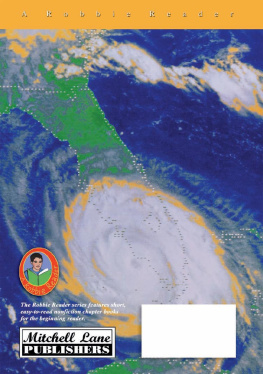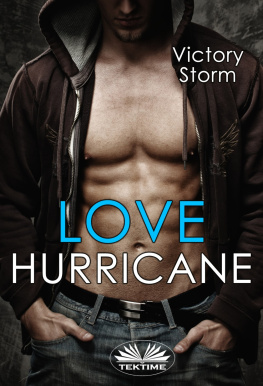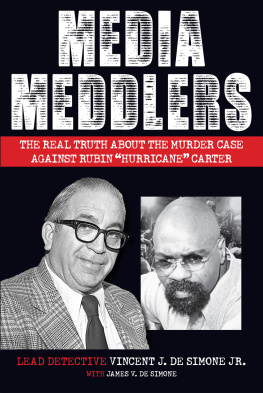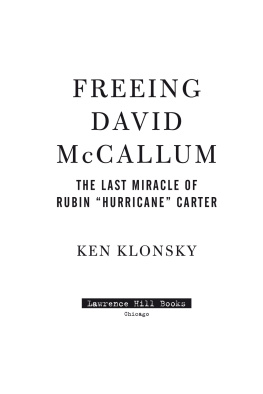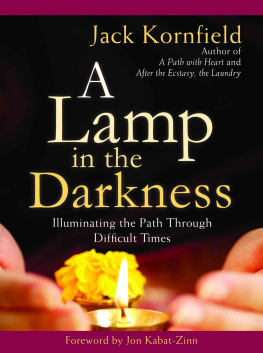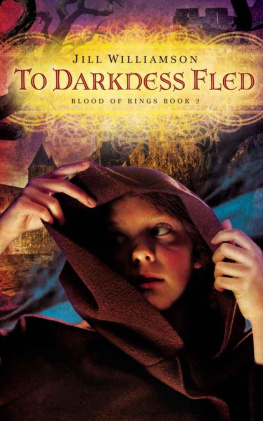Rubin Hurricane Carter - Eye of the hurricane: my path from darkness to freedom
Here you can read online Rubin Hurricane Carter - Eye of the hurricane: my path from darkness to freedom full text of the book (entire story) in english for free. Download pdf and epub, get meaning, cover and reviews about this ebook. City: United States, year: 2011, publisher: Lawrence Hill Books;Chicago Review Press, genre: Religion. Description of the work, (preface) as well as reviews are available. Best literature library LitArk.com created for fans of good reading and offers a wide selection of genres:
Romance novel
Science fiction
Adventure
Detective
Science
History
Home and family
Prose
Art
Politics
Computer
Non-fiction
Religion
Business
Children
Humor
Choose a favorite category and find really read worthwhile books. Enjoy immersion in the world of imagination, feel the emotions of the characters or learn something new for yourself, make an fascinating discovery.

- Book:Eye of the hurricane: my path from darkness to freedom
- Author:
- Publisher:Lawrence Hill Books;Chicago Review Press
- Genre:
- Year:2011
- City:United States
- Rating:5 / 5
- Favourites:Add to favourites
- Your mark:
- 100
- 1
- 2
- 3
- 4
- 5
Eye of the hurricane: my path from darkness to freedom: summary, description and annotation
We offer to read an annotation, description, summary or preface (depends on what the author of the book "Eye of the hurricane: my path from darkness to freedom" wrote himself). If you haven't found the necessary information about the book — write in the comments, we will try to find it.
Eye of the hurricane: my path from darkness to freedom — read online for free the complete book (whole text) full work
Below is the text of the book, divided by pages. System saving the place of the last page read, allows you to conveniently read the book "Eye of the hurricane: my path from darkness to freedom" online for free, without having to search again every time where you left off. Put a bookmark, and you can go to the page where you finished reading at any time.
Font size:
Interval:
Bookmark:
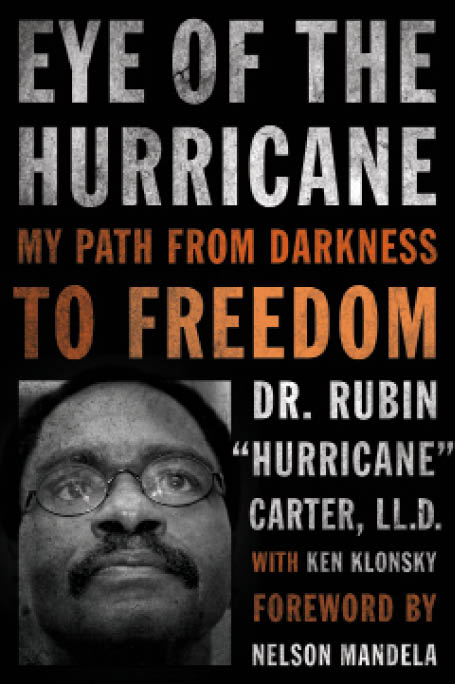
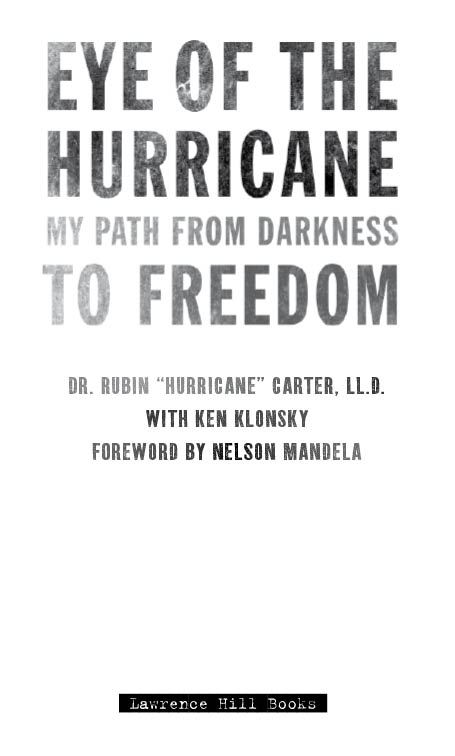
Library of Congress Cataloging-in-Publication Data
Carter, Rubin, 1937
Eye of the hurricane : my path from darkness to freedom / Rubin Hurricane Carter with Ken Klonsky ; foreword by Nelson Mandela.
p. cm.
Includes index.
ISBN 978-1-56976-568-5
1. Carter, Rubin, 1937 2. PrisonersUnited StatesBiography. 3. Judicial errorUnited States. 4. Criminal justice, Administration ofUnited States. I. Klonsky, Kenneth. II. Title.
HV9468.C376A3 2011
.6092dc22
[B]
2010038527
Interior design: Mayfly Design (www.mayflydesign.net)
Short excerpts from this book appeared in an interview with Rubin Carter by Ken Klonsky (edited by Andrew Snee) for The Sun magazine, August 2003, entitled Going the Distance: Rubin Carters Long Journey from Convict to Crusader.
2011 by Dr. Rubin Hurricane Carter, LL.D., and Ken Klonsky
All rights reserved
Published by Lawrence Hill Books
An imprint of Chicago Review Press, Incorporated
814 North Franklin Street
Chicago, Illinois 60610
ISBN 978-1-56976-568-5
Printed in the United States of America
5 4 3 2 1
Contents
Acknowledgments
Foreword
Nelson Mandela
Preface
Ken Klonsky
Introduction
A Prisoner of Ignorance:
Living in Darkness
Chapter 1
Boys Prison:
Light Where the Sun Dont Shine
Chapter 2
The Prison of Family:
What My Father Didnt Tell Me
Chapter 3
Image and Identification:
Two Ways We Keep Ourselves Asleep
Chapter 4
Surviving Prison:
Awakening to Myself
Chapter 5
The Hole in the Wall:
Finding the Higher Path
Chapter 6
Taking the Work Out into the World:
Turning Water into Wine
Chapter 7
The Rewards and Responsibilities of a Conscious Life:
The Way of a One-Eyed Man
Chapter 8
Why I Left the Association in Defense of the Wrongly Convicted:
Acting Upon the Truth
Chapter 9
Just Enough:
Home Free
Appendix
Where the Law Silences the Truth:
The Tragic Wrongful Conviction of David McCallum
To every human being on this earth who
bravely seeks perfection in themselves by looking inward.
In the land of the blind, the one-eyed man is king.
Erasmus, 1510
Kundalini is the force that keeps [us] in a hypnotic state.
To awaken for man means to be dehypnotized.
G. I. Gurdjieff, as translated by P. D. Ouspensky, In Search of the Miraculous
Who you were born to, your social status, where you were born, your religion,
the color of your skin, are all accidental, all part of what can be called the law of accident.
This level of life in which we live and breathe and exercise our beings is controlled
by the law of accident.
Dr. Rubin Hurricane Carter
Acknowledgments
Dr. Carter would like to acknowledge the following people for their contributions to the writing of this book: John Artis, for his love of Truth which allowed me to live long enough to write this book; Sam Leslie, for standing by me as the best friend Ive ever had and for his bravery in taking the work out into the world; Thom Kidrin, for being my lifeline to the world by supplying sustenance for the body and food for the mind during my long prison ordeal; Alonzo Starling, former chief of staff at Innocence International, for keeping me on track and for the pure joy of his company; Judge H. Lee Sarokin, for being my King Solomon and swimming against the current.
The authors would like to thank the late Larry Hoffman, former Canadian Ambassador James George, and the late Annie Jacobsen for their invaluable assistance and encouragement. The authors would also like to recognize Morty Mint of the Mint Agency for his diligent work in shepherding the book to its publication. In addition, they would like to thank Verna Relkoff of the Mint Agency for her incisive edit and reorganization of the manuscript. Finally, the authors would like to thank Sue Betz and Devon Freeny of Chicago Review Press for their editing and their patience.
Foreword
Nelson Mandela
Rubin Carter embarked upon a journey of reconciliation many years ago. His path was longer and more difficult than others who had preceded him, for Rubins Spirit was dead. In his powerful testament, The Sixteenth Round , written more than thirty years ago, Rubin describes the effect on him of the racism and brutality of the American prison system: The treacherous years of living in [prison] had done their job to perfection: they killed my poor heart dead.
His self-diagnosis was hardly surprising: twenty years in prison for a crime he did not commit can kill the strongest of men. The lesson he was learning in prison was that life was capricious... always subjected to someone elses whim. From that analysis it is easy to despair; it is easy to believe, especially as a black man who grew up in a segregated society, that all hope is gone.
It is to Rubin Carters credit, fighter that he is, that he refused to accept his own death sentence, just as he refused to accept the guilty verdict of the state of New Jersey. Rubin chose to live, and his means of living was to seek out his inner self. In that bleakest and most unforgiving corner of the world, prison, Rubin chose to dream, to dream of life beyond the steel bars and concrete walls, a life of helping and a life of peace. The hate that placed him in prison, the hate that was mirrored in his soul, could never be the means of his freedom.
His first step toward freedom was knowing he needed the help of others, that he lived in a larger world where the possibility of good existed. Rubin communicated with the outside world, he read voraciously, and he began to understand. As he writes in this book, The more laws we are under, the less free we are. I lived under paternal law, American law, the law of segregation, criminal justice law, military law, and prison law, so I was never any freer than a slave.... No matter who you are, you are born into the universal prison, the world of sleeping people and mechanical laws.... The only escape from the physical, the metaphorical, or the universal prison of sleep is to wake up!
Rubin woke up in prison and became a free man. Once his freedom became a physical fact, Rubin determined that he must come to the aid of all those languishing in prison for crimes they never committed, the victims of injustice. That has been the life of Rubin Carter since he was released from prison, giving back the work, as he says. At times, the personal price has been steep, but the commitment to give back has never lessened, never faltered.
I commend Rubin Carter and the dedication he has for others. He has journeyed a long way and has touched the hearts and souls of many with whom he has come into contact. His rich heart is now alive in love, compassion, and understanding.
Preface
Ken Klonsky
Highway 209, south and west of Kingston, New York, lined by prosperous villages, farmhouses, and rolling hills, looked and felt on that November morning of 2004 like a bucolic paradise, a gentle road to nowhere. Golden autumn leaves, a blue sky, and a hint in the air of summer past were marred only by the occasional sign to remind us that this was the day after election day, a day on which George W. Bush had won the presidency for the second time.
The closer we approached our destination, the shabbier the villages and the farmhouses became. That destination, Eastern New York Correctional Facility, a gray stone structure built on a disproportionate scale, appeared incongruous in this setting. The width of its frontage gave the impression that the building had no depth, like a movie set for an old-fashioned medieval spectacle. Flanking the prison were two gargantuan turrets shaped like chess rooks. The multi-tiered building with heavily barred windows sent a subliminal message: Leave all hope behind, you who enter here . Maximum security. Minimum hope.
Next pageFont size:
Interval:
Bookmark:
Similar books «Eye of the hurricane: my path from darkness to freedom»
Look at similar books to Eye of the hurricane: my path from darkness to freedom. We have selected literature similar in name and meaning in the hope of providing readers with more options to find new, interesting, not yet read works.
Discussion, reviews of the book Eye of the hurricane: my path from darkness to freedom and just readers' own opinions. Leave your comments, write what you think about the work, its meaning or the main characters. Specify what exactly you liked and what you didn't like, and why you think so.

